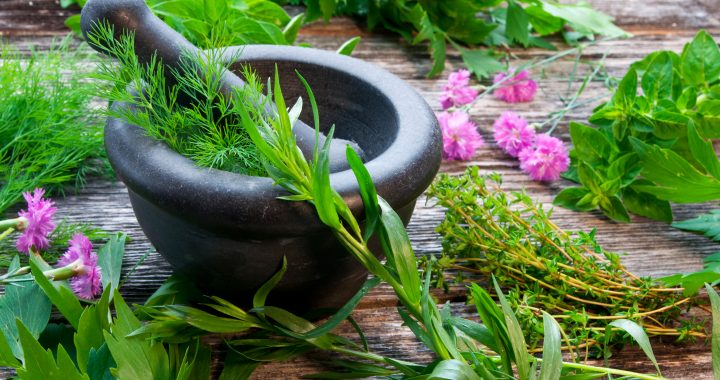HERBS
In health care we should first take the advice of Hippocrates, the Father of modern medicine who said, “Let your food be your medicine and your medicine your food.” It just makes sense to use diet and lifestyle as the foundation of health. Herbs are the highest quality foods available, which contain naturally and harmoniously balanced vitamins, minerals and trace elements. Herbal medicine is the most ancient form of health care known to humankind. Yet because of economics, modern medicine has veered away from the use of pure herbs in the treatment of disease. Herbs by their very nature cannot be patented. Because of this drug companies cannot hold the exclusive right to sell a particular herb, thus they are not motivated to invest in testing or promoting herbs.
A few years ago I talked to a pharmacist about carrying natural remedies and herbs in their pharmacy. I was amazed at the response. This young pharmacist had grave concern about the safety of herbal remedies. Where are the double blind tests? She asked. How do we know herbs are safe? Unlike pharmaceuticals, which are often harsh stimulants and poisons, herbs are gentle and not dangerous when taken correctly. For thousands of years herbs have been used safely and effectively.
The bible has many examples of herbal use starting in Genesis 1:29-30: “And God said, ‘See, I have given you every herb that yields seed which is on the face of all the earth, and every tree whose fruit yields seed; to you it shall be for food. Also, to every beast of the earth, to every bird of the air, and to everything that creeps on the earth, in which there is life, I have given every green herb for food’, and it was so.” In the book of Revelations 22:2 there is a tree (not a pharmacy) that brings healing to the nations.
Herbs are at the root of both Traditional Chinese and Ayurveda medicine. In Western Medicine the use of medicinal plants is fundamental. When my father attended pharmacy school over 50 years ago, he had to identify herbs by sight, smell, and taste. He had to know how to compound them into medications. His personal return to natural medicine came as he remembered the natural basis of the medicine of his youth.
Today, as drug companies are pushing the synthetic, herbal medicine is experiencing a renaissance worldwide. This phenomenon is due to the growing concern about the side effects of pharmaceutical drugs, the impersonal and often demeaning experience of modern health-care practices, and a renewed recognition of the unique medicinal value of herbs.
Herbs are more elegant and less harsh than drugs; though their action is often slower in the inception, they provide remarkable lasting results. As integrative medicine proponent Andrew Weil, M.D. said, “Herbs and the dietary supplements made from them use an indirect route to the bloodstream and target organs, their effects are usually slower in onset and less dramatic than those of purified drugs administered by more direct routes. Doctors and patients accustomed to the rapid, intense effects of synthetic medicines may become impatient with botanicals for this reason.”
Many people attempt to use herbs to simply control symptoms, though they are seldom as effective as their heavy-handed chemical-drug counterparts. Suppressing symptoms does not heal. This is true for both herbs and drugs. To use herbs to their true advantage – the ability to support the body’s effort to heal itself – we must understand the body’s actions and the action of the herb.
The body is designed to be healthy and self-healing. When the natural state of health fails with the onset of disease, one of two events has occurred. We have become deficient in essential resources necessary for maintenance and protection, or we have accumulated excess toxins and irritants. Thus, the best use of herbs would be to take out the trash and restock the pantry: Detoxification and Regeneration. The medicinal action of herbs can be classified into three general groups: Detoxifying, Regenerating, and Symptom Regulating. Balancing the desire for comfort and the need for some regulation of events with the body’s choices and its own innate intelligence, constitutes a great part of the herbalist’s art.
Detoxifying herbs are used to eliminate blockages and excesses. When toxins, irritants, and pathogens have accumulated in the body, they must be removed or disease will manifest. To remove this “bio-sludge,” herbs are used that have properties that tend to stimulate the self-cleansing processes of the system. For example, herbs with laxative properties cleanse the bowel, diuretics detoxify the kidneys and alterative herbs aid in cleansing the blood. The resolution of virtually every disease of the human frame will be beneficially affected by clearing the metabolic and pathogenic debris that has accumulated in the body.
Regenerating herbs are those that build and tone depleted and overwhelmed tissues and functions. Regenerating herbs nourish and strengthen the body, improving the operating efficiency and recuperative powers of all tissues and organs. This bolsters resistance to disease. We use these herbs to recover from acute and chronic ailments, injury, and surgery.
Some herbs are used as crisis management and pain relief. Symptom regulating herbs are beneficial once detoxification and rebuilding is underway. This category of herbs mitigates the uncomfortable symptoms that called us into action in the first place. However, if we only look for symptom relief and neglect detoxifying and regeneration we will never deal with root causes. As a naturopath and master herbalist, it is vital to deal with root causes which will release the body’s powerful resources to provide optimal health.

